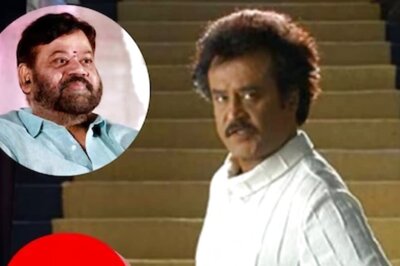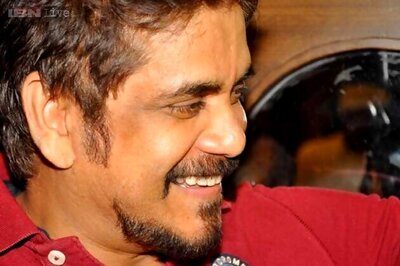
views
New Delhi: That the posters bearing her name simply say 'Atishi' is not accidental. For Atishi Marlena, formerly the advisor to Delhi Education Minister Manish Sisodia, inauguration of the AAP office by Delhi Chief Minister Arvind Kejriwal was not just the party's intent but also how much it had evolved since the early days of the 'India Against Corruption’ movement.
Atishi, although still not officially AAP’s 2019 candidate for East Delhi Lok Sabha seat, has been campaigning in the area for the past few months. Her photograph on campaign materials has been clicked by a ‘local passport photo shop’ and not a professional photographer. Her campaign has been carefully calibrated to ensure that "people think of her as one of their own", said a senior leader.
The inauguration of the office had been planned carefully. The venue: a small strip of empty land in the crowded Laxmi Nagar market, directly underneath the Metro and flanked by shops that promised everything from success in examinations to relaxing massages. As Kejriwal began to sleep after 5pm, the rush hour crowd traversed through the Metro station overhead, his words reverberating.
Hers is not the only silent campaign. Others like former Delhi-in charge Dilip Pandey in North East Delhi, Pankaj Gupta in Chandni Chowk, Guggan Singh Ranga in North West Delhi and Raghav Chadha in South Delhi have all been campaigning for the past months. "The idea was to ensure that we reached out to the people while ensuring that the opposition parties had little or no idea about us," said a senior AAP leader.
The strategy isn't without precedent. Although in 2013 the party's debut in electoral politics resulted in them forming the government with support from the Congress, it wasn't until the 2015 snaps polls that the party really came into its own. The lessons though, learnt from the success in 2013 and the drubbing the year after that, haven't been forgotten.
"We have realised over the years that a campaign often feels successful. But that is because, as a new party, we must start early. But when other opposition parties get in the fray, you realise that they simply didn't need to work as hard. This is what happened in Goa."
Electoral victories and losses aside, the party has also seen two high-profile exits in the past few weeks. Senior leaders like Ashish Khetan and Ashutosh (both Lok Sabha candidates in the 2014 polls) quit the party, resulting in questions about the "sudden dearth of trusted leaders". Add to that, key leaders who helped shape the 2015 campaign, including Yogendra Yadav and Prashant Bhushan, are no longer with the party, while star campaigner Kumar Vishwas is at best a 'rebel' leader.
But a Delhi AAP MLA countered: "They have both left the party for non-political reasons... It doesn't make a difference to the 2019 campaign."
Meanwhile, any possibility of an understanding with the Congress, overt or otherwise, seems unlikely now. As one senior AAP leader put it, "The Congress pushed us to this point. There was a moment where the party was willing to take on the BJP as a collective force. But that is no longer the case."
As Arvind Kejriwal put it on Monday, the Congress was “finished” in the national capital and had been reduced to a “vote cutter for the AAP”. “By voting for the Congress, you will essentially strengthen the BJP,” he said.
For AAP, the last three years in power have, as one party minister described it, "a learning experience". "At every step, there were attempts to trip us. But whatever we endured, from false cases to smear campaigns by the opposition, it has just made us stronger and made us learn about the tactics that the BJP uses. The MCD polls were a disaster. But after that, we did well in Bawana and our organisation strength has been improving consistently."
What this "learning experience" has translated into, points out the party, is a "smarter, quieter campaign". In the past two months, each of the four leaders have been regularly touring their constituency. Take for instance, last Friday, when AAP leader Dilip Pandey’s campaign got an endorsement from rebel BJP MP Shatrughan Sinha, who urged people to support him, and criticised the BJP. It was no coincidence that Pandey is going up against Delhi BJP chief Manoj Tiwari, who is the MP from the North East Delhi constituency that houses a large number of migrants from Uttar Pradesh and Bihar. Their support is essential for candidates contesting from the seat.
Marlena, on the other hand, has also been regularly been visiting different parts of the constituency. "From jagratas to school functions, she has been meeting as many people and telling them about what she wants to do. She is a singular figure, not just because of her background as an educationists, but her own qualifications," said an AAP leader.
AAP leaders pointed out that each of the four candidates they've singled out so far have their own "unique strengths" — Marlena’s efforts for improvement in standards of Delhi's schools, Pandey's connect with the community of migrants from Bihar and Uttar Pradesh, Chadha's "star personality" and popularity among the youth and Gupta's acceptability among the trader community in Chandni Chowk.




















Comments
0 comment